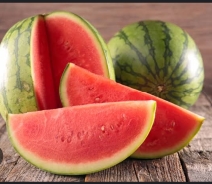
Health benefits of watermelon (Part 2)
CITIZENS COMPASS – Recently, we served you the health benefits of watermelon and we hope it was worthwhile
Do enjoy part two of the piece:
Many people are still not aware of the benefits of eating Watermelon. To be more specific, people are not aware of the health benefits of Tarbooz. But, if you are also one of them, then here you get 22 incredible watermelon fruit benefits for the skin, hair, and health.
High in antioxidants:
Watermelon has high amounts of flavonoids, carotenoids, triterpenoids, and phenolic compounds. You will be able to neutralize free radicals and reduces inflammation with the help of the carotenoid lycopene. Watermelon also has triterpenoid cucurbitacin E, which blocks the activity of cyclooxygenase enzymes with its anti-inflammatory properties.
Strengthens immune system:
Watermelon helps strengthen your body’s immune system since it is a rich source of Vitamin C. It also helps your immune system produce antibodies since it is a rich source of vitamin B6. In addition, vitamin A in the fruit protects your body from infections by regulating the immune system while aiding in the formation of red blood cells (1).
Stress buster:
Watermelon is one of the fruits that will help you relieve stress because Watermelon contains vitamins and nutrients in high amounts, such as Vitamin B6. These nutrients ease panic attacks and anxiety and relieve stress by producing the required chemicals to do the same. In addition, you will be able to relax your blood vessels without the side effects of drugs by adding Watermelon into your diet.
Improves heart health:
It is worth noting that lifestyle factors play an essential role in lowering the risk of heart disease, a leading cause of death globally. For example, watermelon is good for the heart by lowering blood pressure and cholesterol levels, reducing the risk of a heart attack (2). Lycopene might also prevent oxidative damage by lowering blood pressure and cholesterol (3). Watermelon also contains magnesium, potassium, vitamins A, B6 and C, heart-healthy vitamins and minerals.
Reduce muscle soreness:
Watermelon might be the perfect key for muscle soreness, whether it is trouble after a workout or strain. This fruit helps soothe sore muscles after a heavy workout since it is packed with electrolytes and amino acid citrulline. In addition, Citrulline in watermelons can help reduce muscle fatigue, as per an Iranian study. Citrulline might help relieve muscle soreness by accelerating the process of lactic acid removal. Drinking watermelon juice might help your muscles recover faster by receiving more oxygen.
Prevents kidney injury:
The percentage of potassium is lower in Watermelons than in other foods, though they are a good source of potassium. Therefore, people suffering from chronic kidney disease need to stick to low-potassium fruit options. Watermelon can be a healthy option for you (4). However, the kidneys might not eliminate excess potassium from the blood in some individuals suffering from chronic kidney disease. Therefore, this might cause complications. Therefore, consult your doctor before eating Watermelon if you have chronic kidney disease.
Good for your liver:
Unlike Alcohol and Caffeine, Watermelon increases urine flow without straining the kidney by acting as a natural diuretic. It also helps your liver process Ammonia, which helps the kidneys get rid of excess fluid without putting strain on them.
Prevents cancer:
Watermelon benefits for cancer also come from the compound Lycopene, which reduces the extent of cancer insurgence. In addition, the characteristic red colour of watermelons comes from the pigment Lycopene, which also prevents the onset of certain cancers since it is a powerful antioxidant (5
Watermelon benefits weight loss:
Did you know watermelon benefits weight loss? Yes! Watermelon can make you feel full with fewer calories because of its high water content (8). In addition, the high amount of water in Watermelon might contribute to weight loss by speeding up metabolism and flushing out toxins and fats. So by adding fruits like Watermelon that have low-calorie density into your diet, you will be able to lose weight healthily (9).
Watermelon Safe for people with diabetes :
Although watermelon benefits diabetes, it is necessary to be cautious. Watermelon has a lower glycemic load but a higher glycemic index and, therefore, a diabetic-friendly fruit. In addition, Watermelon has anti-diabetic properties, as per a Nigerian study (10). Another study shows that watermelon pomace juice might eventually treat diabetes by increasing the mass of brown adipose tissue and reducing excess white fat mass. However, some studies state the opposite effect. Therefore, it is best to take your doctor’s advice before consuming Watermelon if you have diabetes.
Helps to manage high blood pressure:
Watermelon is especially beneficial for blood pressure because it has a natural source of Citrulline. In addition, it is closely related to an amino acid called arginine, which plays an essential role in blood pressure maintenance. As per the study, volunteers’ consumption of concentrated Watermelon juice increases the arginine levels converted from Citrulline. Furthermore, potassium is another nutrient in Watermelon that reduces and regulates high blood pressure.
Keeps brain and nervous system healthy:
Watermelon has another antioxidant called Choline which contributes to several functions and activities. Some of the activities are muscle movement, learning and memory, the transmission of nerve impulses, early brain development and maintaining the structure of cell membranes. Although there is not enough evidence, Choline might slow down the progression of dementia in Alzheimer’s disease, as per theory (11).
Promotes blood flow:
Watermelon can be an excellent option for improving blood circulation. It also helps lower blood pressure, thereby helping your heart in the process. Watermelon can make blood vessels more flexible, increasing blood flow with the help of the potassium in the fruit. It also eases the stress on the heart in the process.







